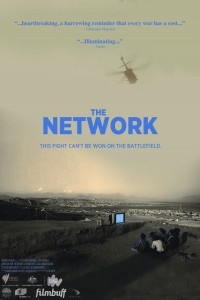
Release Date: September 27, 2013 (Limited)
Director: Eva Orner
MPAA Rating: NR
Film Pulse Score: 5/10
Written, directed, and produced by Eva Orner, The Network is a somewhat interesting account of the largest television network in Afghanistan. It starts as a history-of-the-network lesson, then transitions into showing audiences what kind of programming the network has, and finishing by letting employees talk about their hopes and fears for the future of their war-torn country. It is somewhat interesting, as I said, and could have been made more interesting if the network’s story was given more context with what has been happening in Afghanistan since international forces led by the United States invaded and kicked the Taliban out of power in 2002.
TOLO – the network in question – actually began as a radio station with few employees. It was the brain child of a family, mostly led by the three brothers, who were Afghan refugees living in Australia from the late 1970s until the early 2000s. The brothers came back to Afghanistan to be part of what they hoped would be a brighter future for their country – a country so torn by war, lack of wealth, and a system that treats females as second-class citizens. They decided to start a radio station and it was so successful that within a couple of years, they went into television broadcasting.
We are introduced to the Afghani brothers who created the studio, as well as to several foreigners who were brought in by them to lend professional support for what was largely a non-professional staff. After all, in the last several years before all this started, there was no radio or television allowed, so none of the Afghani staff really knew what they were doing. The film then takes us on a journey of some of TOLO’s programming. It is here were the film slows down and my interest waned a bit. Yes, it was something to see a soap opera and police shows on Afghan television that were receiving good numbers of viewers. But Orner’s decision to spend so much time on the network’s programming that only hinted at its impact on its audience and the larger society left me wanting more context. She comes close to achieving the right balance when she allows the network staff to talk about the relationship between the people’s view of Afghani security forces and the popularity of dramas about those very security forces.
The film ends on a sad note and many non-Afghani staffers talk about leaving soon and many Afghani staffers wonder what will happen when the international forces leave – note, this film was shot in 2011; some draw-down of troops has occurred by now in Afghanistan. They seemed to present a mix of hopeful optimism and horrified realism about what the future holds for them, the network, and the country.
It is a worth-while documentary to make, don’t get me wrong; but its execution was off enough to make it hard to stay with it the way a great documentary makes you do. I think the discussion of new and/or old media in a country like Afghanistan is utterly fascinating and a valiant effort is made by Orner to show off what at least one network has done. If only it had shown off more of what was important about the network in the larger context; that is where the “showing off” needed to occur here.






